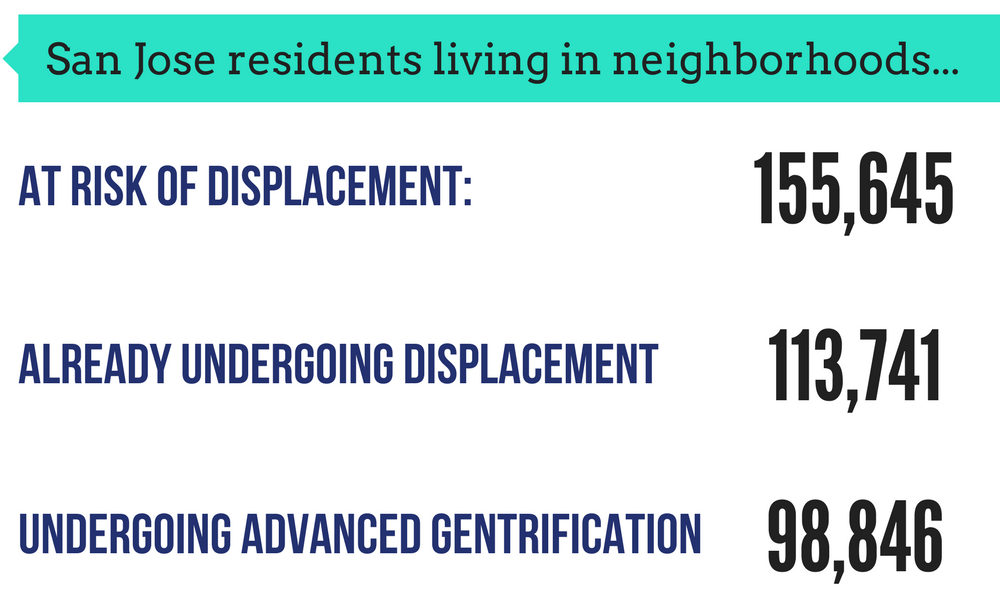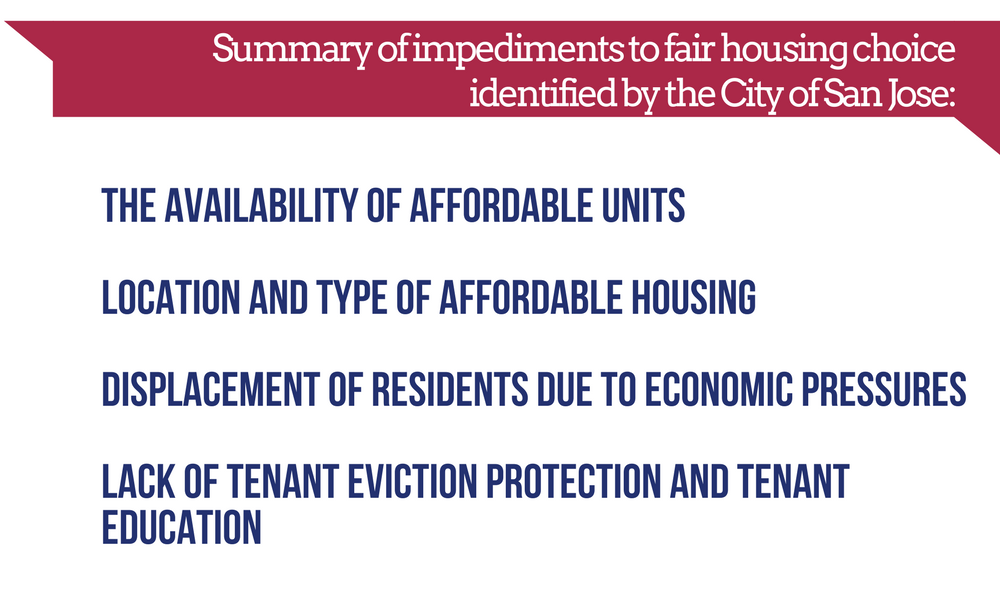June 27, 2017
By David Zisser
Fair housing and anti-displacement advocates won an important victory on April 25th in San Jose that may have repercussions at the regional, state, and even national levels. In response to advocacy by Public Advocates and the Law Foundation of Silicon Valley, the City Council officially acknowledged that economic displacement and the lack of tenant protections are civil rights issues that disproportionately impact people of color and other vulnerable populations.
Moreover, the City Council committed to taking specific actions to protect tenants from displacement.

More than half of low-income households live in neighborhoods at risk of or already experiencing displacement and gentrification. For more information about displacement in San Jose, see UC Berkeley’s Urban Displacement Project.
Under the federal Fair Housing Act, every local jurisdiction that receives federal housing funds must “affirmatively further fair housing,” or “AFFH.” Under 1996 guidelines issued by the U.S. Department of Housing and Urban Development (HUD), these jurisdictions must complete an Analysis of Impediments to Fair Housing Choice – or an “AI” – that identifies barriers to housing choices available to people, racial integration, and access to economic and educational opportunities. The AI must also include actions the jurisdiction plans to take to overcome those barriers. Under a 2015 HUD rule, the AI transformed into an Assessment of Fair Housing, or “AFH.” San Jose is scheduled to complete its first AFH in 2019.
San Jose’s final AI improves significantly on the original draft, which did not include any language about displacement or tenant protections until Public Advocates and the Law Foundation of Silicon Valley provided detailed recommendations and met with City staff. This advocacy built on Public Advocates’ previous success winning a similar result in Oakland’s AI in 2016 and on our framing of the displacement crisis in San Francisco’s Mission District as a civil rights issue.
Another tool in the fight against displacement
Getting the City to include displacement as an impediment to fair housing – and potential policies to tackle displacement – in its AI is a major victory for several key reasons. Most importantly, this provides additional leverage in the fight to protect low-income tenants from displacement.
Moreover, because the AFFH duty requires cities to actually implement policies to address fair housing issues, the City is now legally obligated to do something about displacement. For example, in the AI, the City commits to exploring a policy to protect tenants against source of income (SOI) discrimination, which would prohibit landlords from turning prospective tenants away because they have a Section 8 voucher. The recent passage of a “just cause” eviction ordinance is also a first step towards implementation of the AI, but more will be needed.

Finally, San Jose is the center of Silicon Valley, the largest city in the Bay Area, the third largest in California, and the tenth largest in the U.S. That means San Jose sets an important national precedent. Building on work in Oakland and Washington, DC, San Jose has made a significant contribution to a growing recognition of the connection between displacement and fair housing. To fulfill their obligation to affirmatively further fair housing, others should follow.
For example, Public Advocates is working with community partners in neighboring San Mateo County to ensure that its 2017 Assessment of Fair Housing includes a robust analysis of displacement and strategies to address it.
California Resists Federal Threats to Fair Housing
While California jurisdictions carry forward with their fair housing plans, Congress is considering legislation that would gut 2015 Obama regulations that HUD Secretary Ben Carson has belittled as “social engineering.” Although the obligation to affirmatively further fair housing exists under the Fair Housing Act with or without implementing rules and regulations, the undermining of the AFFH duty at the federal level is troubling. Public Advocates recently submitted comments to HUD to defend these important regulations, and Public Advocates staff attorney Anne Bellows wrote this blog post on deregulation efforts by the Trump administration.
Because of these and other threats at the federal level, Public Advocates (in collaboration with Poverty & Race Research Action Council, the Lawyers’ Committee for Civil Rights Under Law, PolicyLink and the Right to the City Alliance) has launched CarsonWatch, which is committed to stopping President Trump, Secretary Ben Carson, and their Congressional allies from any attempts to roll back fair housing protections and undermine the housing security of millions of Americans.
Meanwhile, here in California, Public Advocates is co-sponsoring state legislation, AB 686, that would reinforce California’s commitment to fair housing by requiring public agencies to administer their programs in a manner that affirmatively furthers fair housing, including protecting existing residents against displacement.
Take Action
We can all do our part to ensure that all cities treat displacement as a civil rights issue that affects vulnerable communities the most. You can start by finding out the due date of your city or county’s Assessment of Fair Housing. Then urge your local officials to push forward regardless of what happens in Washington, D.C., and ensure that the AFH identifies displacement as a fair housing issue and includes meaningful actions to address it. You can also urge your state senator to support AB 686 to codify the duty to affirmatively further fair housing in California law.
Read more about San Jose’s findings on displacement here.

